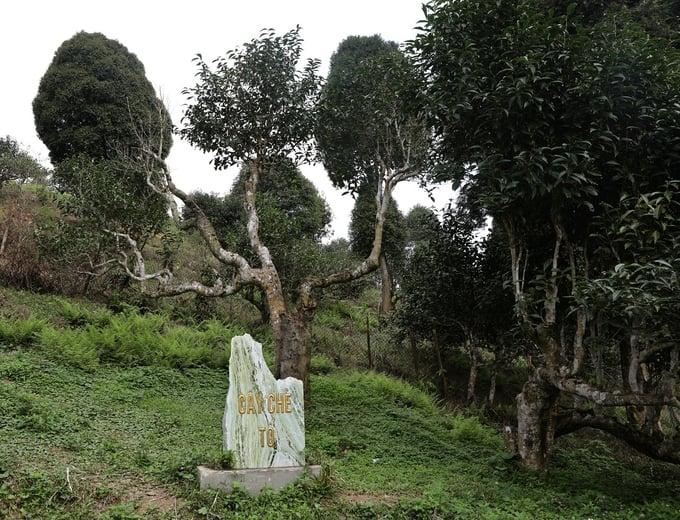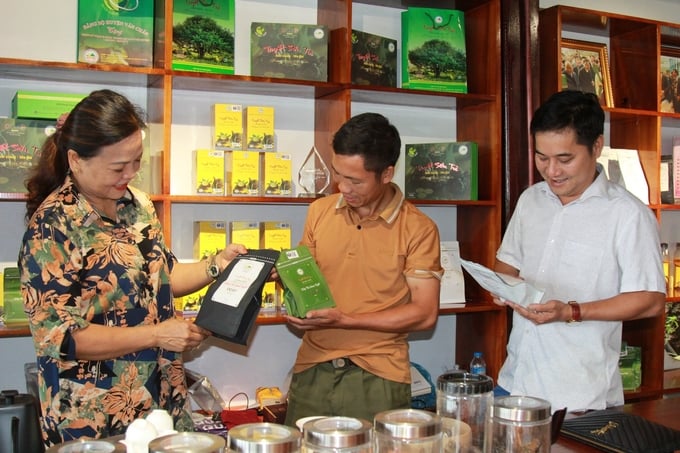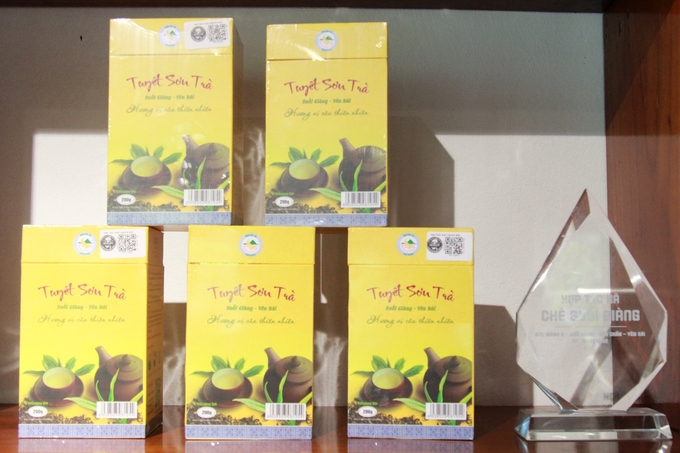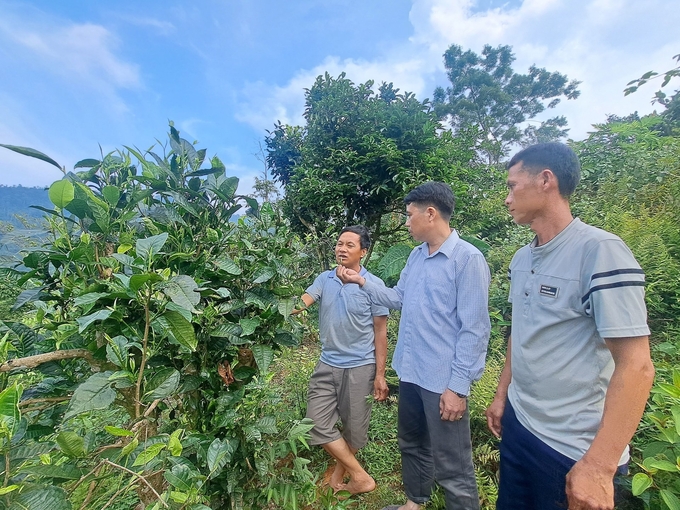November 27, 2025 | 15:13 GMT +7
November 27, 2025 | 15:13 GMT +7
Hotline: 0913.378.918
November 27, 2025 | 15:13 GMT +7
Hotline: 0913.378.918
Shan Tuyet tea is integral to the subsistence of montane minorities, including the Mong ethnic group. Historically, the Shan Tuyet tea tree was planted to conserve soil and water, prevent erosion, and safeguard villages. Now, Shan Tuyet tea is considered a high-value commodity, serving as a primary source of income for a number of households and attracting travelers to the province with its unique characteristics.

The Shan Tuyet tea tree is over 300 years old in Suoi Giang commune. Photo: Thanh Tien.
Whoever visits Suoi Giang commune, Van Chan district (Yen Bai province), will be awestruck by the horizontal view of gigantic, ancient Shan Tuyet tea trees with tangled branches that force harvesters to clamber up. The Shan Tuyet tea area in Suoi Giang extends over an area of nearly 500 hectares, of which the area of naturally growing trees is 293 hectares, primarily in the localities of Giang Cao, Giang B, Pang Cang, Tap Lang, Suoi Lop...
There are presently over 40,000 ancient Shan Tuyet tea trees in Suoi Giang that are between 100 and 300 years old. Shan Tuyet tea has very large blooms, and its exteriors are covered with a layer of snow-like white powder. The majority of Shan Tuyet tea is grown organically, so the trees are very robust, live long lives, and require little fertilization.
Mr. Mua A Chu (commune of Suoi Giang) shared that when harvesting Shan Tuyet tea, only mature blossoms are selected. The more snow-covered they are, the greater their flavor and medicinal properties. The complete tea roasting process is carried out with extreme precision. Additionally, the firewood must be dry and well-burned for the tea liquid to change green when it is roasted. Place the tea buds in the pan and massage them gently, being cautious not to crush the tea or cause the snow that adheres to the leaves and buds to fall off. After completion, the tea blossoms were as large as green beans, were still covered in snow, and had a delicate scent.

Currently in Suoi Giang commune, there are 4 products from Shan Tuyet tea that meet OCOP standards and are exported. Photo: Thanh Tien.
Mr. Luong Van Tam, chairman of the Suoi Giang Commune People's Committee, stated that two tea processing companies, Song Gia Tra Company Limited and Shan Tuyet Tea Joint Stock Company, are presently operating in the commune. Additionally, there are three tea production cooperatives, namely the Suoi Giang Cooperative, the Suoi Giang Organic Tea Production Cooperative, and the Suoi Giang Tourism Ecosystem Cooperative, as well as twelve households that produce, process, and trade tea. The commune currently possesses six 4-star OCOP products, including Tuyet Son Tea Suoi Giang, Black Suoi Giang Tea, Royal Tea Suoi Giang, Diep Tea Suoi Giang, and White Suoi Giang Tea.
Ms. Lam Thi Thoa, director of the Suoi Giang Tea Cooperative (Van Chan district), stated that the cooperative has signed an agreement with households in the commune to cover consumption and purchase fresh tea stems at stable prices and for regional planning. the use of durable materials. The processing and packaging of tea products are carried out in accordance with technical procedures, guaranteeing stringent standards, so the quality of tea products is improved and is very popular with domestic and foreign tea enthusiasts.
Shan Tuyet Tea Diep and Shan Tuyet Black Tea are two of the ten agricultural products of Yen Bai province that were recently exported to the United Kingdom. All of these products meet European standards for food safety criteria, quality indicators, packaging design, and labels.

Tuyet Son Tra tea products of Suoi Giang Tea Cooperative are exported to the UK. Photo: Thanh Tien.
Scientists consider Yen Bai to be one of the ancestral lands of the tea plant, as it contains numerous uncommon genetic resources and has a flavorful tea aroma. Yen Bai is the region with the greatest area of Shan Tuyet tea in the country. Unique characteristics that cannot be obtained elsewhere. Preserving and developing Shan Tuyet tea trees in a sustainable manner is of imperative importance, contributing significantly to the socioeconomic development of highland people.
To preserve and promote the value of Shan Tuyet tea, Yen Bai province has instructed localities to coordinate with relevant sectors to affix serially numbered signs, record information, create monitoring books, and create diagrams and signposts in concentrated areas to guide and promote the ancient Shan Tuyet tea region.

People in Kien Thanh commune (Tran Yen district, Yen Bai) are expanding the area of Shan Tuyet tea for economic development and tourism. Photo: Thanh Tien.
Along with this, a document was issued directing inspection, supervision, and prohibiting the exploitation and export of ancient tea trees. If acts of felling and exploitation are discovered, they will be dealt with severely.
Translated by Linh Linh

(VAN) On the morning of November 27 in Beijing, Minister Tran Duc Thang and the Deputy Commissioner General of the General Administration of Customs of China signed a protocol on fresh jackfruit exports.

(VAN) As floodwaters recede, a vast network of irrigation works across eastern Gia Lai is emerging in a state of severe disrepair, with extensive damage demanding urgent restoration ahead of the 2025-2026 winter-spring cropping season.

(VAN) The conference reviewing three years of implementing Decision 911 identified the need to prioritize improving marine environmental quality and promoting sustainable fisheries development.

(VAN) Le Hoai Trung, Member of the Communist Party of Viet Nam Central Committee and Minister of Foreign Affairs, held talks with Vi Thao, Chairman of the Guangxi Zhuang Autonomous Region (China) this week.

(VAN) The Mekong River Commission adopts the 2026 - 2030 Strategic Plan with a people-centered approach.
/2025/11/26/1720-1-200855_132.jpg)
(VAN) Viet Nam and Japan have many conditions to expand cooperation on climate change adaptation, particularly in disaster risk management based on advanced technologies.

(VAN) The strong development of digital technology and artificial intelligence is opening up opportunities to transform science and technology into a 'Magic eye' for disaster forecasting and early warning.